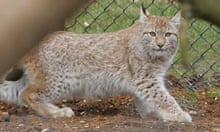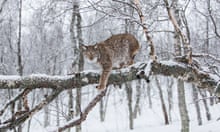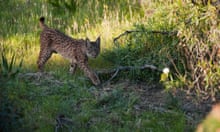It’s English countryside as you’ve never seen it before. Taking a walk through Knepp Castle estate in the leafy Sussex countryside is bewildering, challenging and utterly thrilling.
A fallow deer hurtles from a blackthorn thicket. Buzzards rise from every copse. A purple emperor butterfly glides around an oak. A shrew scuttles between stunted hawthorns, shaped into topiary by free-ranging cattle. It feels like the land has been set free – and in 2001, these 3,500 acres were. Their owner, Charlie Burrell, inherited a conventional dairy and arable farm but, inspired by Frans Vera, a Dutch rewilding ecologist, took his land out of conventional cultivation.
What’s happened since is astonishing. Hedges have marched into fields, meadows have filled with wild flowers, young oaks and sallow thickets – an explosion of fecundity. Such fertility is squandered by rewilding, say critics, who argue that it is crazy to pay subsidies to farmers to stop producing food when Britain already eats far more than it can grow.
Knepp offers a riposte to this. Despite rewilding, it is still a farm that produces 75 tonnes of quality organic meat each year from Burrell’s free-grazing animals – Old English longhorn cattle, Tamworth pigs, Exmoor ponies and roe and fallow deer.
Land like Knepp looks alien but may become more familiar: if Brexit means a drastic cut in farm subsidies, thousands of acres of Britain’s less-productive farmland will be abandoned. Knepp receives EU environmental subsidies, but Burrell believes he is better placed than most to survive subsidy-free: income streams include camping, tourism, and business and cottage rentals, but such options aren’t available to many farmers.
As well as concerns over lost food production, some conservationists worry that rewilded land damages biodiversity, because some species won’t survive in heavily forested wilderness. Rewilders argue that grazing animals produce a patchwork of sunny glades as well as dense woodland, and Burrell has another revolutionary answer to rewilding critics: why not have pop-up Knepps?
A smart post-Brexit subsidy regime could enable some farms to be taken out of production for, say, a 25-year period, so there would be a constantly shifting supply of recently “rewilded” areas, providing Knepp’s dynamic mix of meadow and scrub so valuable to wildlife. Productive farmland would never be permanently lost.
We all struggle with change; perhaps conservationists’ next great challenge is to create a more positive kind of impermanence.
The lynx effect
I’m longing for the lost innocence of silly seasons past when we worried about nothing bigger than chip-stealing seagulls or great white sharks. So bravo for the Brexit-defying breakout of Flaviu. This “ferocious big cat” – a harmless lynx, a secretive former native species the size of a large domestic cat – is “on the loose” after escaping Dartmoor Zoo. Children have been warned to stay inside.
Flaviu is pursued by drones, helicopters and tranquilliser guns as she pads, we’re told, towards her former home in Kent. Like the tale of the Tamworth Two, the piglets who fled a Wiltshire abattoir (the Daily Mail bought the pigs and named them Butch and Sundance), this one could run and run. I hope it does.
The sun shines on Portugal
Portugal won Euro 2016 and they’re European renewable champions too: for a 107-hour period in May, all their electricity needs were met by solar, wind and hydro. Britain’s solar industry (already devastated by subsidy cuts) will be further damaged if the planned revaluation of commercial properties next year takes solar panel values into account. Higher business tax rates will stop panels being fitted where they belong: on every warehouse roof in the country.








